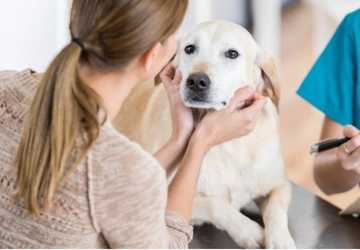Owning a pet entails many obligations, with one of the most paramount being the well-being of your quadruped companion. Grasping, responsible for pet health, ensures your pet enjoys an extended, euphoric, and healthful existence. This all-encompassing guide will delve into various aspects of pet health care and the attendant responsibilities intrinsic to pet ownership.
Pet Owner Responsibilities

As a pet proprietor, you are the primary individual responsible for your pet's health. This duty includes adequate nourishment, regular veterinary consultations, and a secure habitat. Here are some key pet owner responsibilities to consider:
Regular Veterinary Visits
- Orchestrate annual consultations with your veterinarian.
- Ensure your pet is currently on prophylactic inoculations.
- Vigilantly monitor your pet for any signs of malaise and seek medical intervention.
Proper Nutrition
- Provide your pet with a balanced diet appropriate for their age, breed, and health requirements.
- Refrain from alimenting your pet human comestibles that could be detrimental.
- Perpetually ensure the availability of freshwater.
Safe Environment
- Pet-proof your domicile to prevent accidents.
- Provide a commodious sleeping quarter for your pet.
- Engage your pet in habitual physical exertion to maintain their human vigour.
Guide to Pet Health Care
A comprehensive guide to pet health care entails understanding the myriad factors contributing to your pet's well-being. Being well-informed, from prophylactic measures to exigency care, can significantly augment your pet's quality of life.
Preventative Health Measures
Prophylactic health care is pivotal in mitigating the risk of pathologies and trauma in pets. Here are some essential preventative measures:
- Vaccinations: Shield your pet from prevalent infectious diseases.
- Parasite Control: Routinely scrutinize for and ameliorate fleas, ticks, and helminths.
- Dental Care: Brush your pet's dentition and provide dental chews to avert periodontal maladies.
Recognizing Signs of Illness
Comprehending who is responsible for pet health necessitates the insight to discern when your pet is indisposed. Be vigilant for these indicators:
- Variations in appetite or aqua consumption
- Unexplained corporeal weight fluctuation
- Lethargy or excessive dormancy
- Anomalous nodules or protrusions
- Persistent tussis or sternutation
Emergency Care
In a necessity, it's crucial to know the protocols to ensure your pet receives optimal care:
- Maintain a compendium of emergency veterinary clinics in your vicinity.
- Keep a pet first aid kit at home.
- Acquaint yourself with rudimentary pet first aid, such as CPR and wound care.
The Role of Veterinarians
Veterinarians play an indispensable role in pet owner responsibilities by providing expert care and perspicacious guidance. Establishing a robust rapport with your veterinarian is vital for your pet's health.
Routine Check-Ups
Regular visits to the veterinarian facilitate early detection and treatment of potential health anomalies. During these visits, your vet will:
- Conduct a meticulous physical examination
- Discuss your pet's diet and lifestyle
- Recommend vaccinations and parasitic control measures
Specialized Care
Occasionally, your pet may necessitate specialized care from a veterinarian with advanced erudition in specific domains, such as:
- Dermatology: For dermatologic issues and allergies
- Orthopedics: For osseous and articulatory afflictions
- Cardiology: For cardiovascular conditions
Pet Health Insurance

Another facet of who is responsible for pet health is fiscal preparedness. Pet health insurance can help defray unforeseen medical expenditures and ensure your pet receives the requisite care without imposing pecuniary strain.
Choosing the Right Insurance
When selecting pet health insurance, consider the following:
- Coverage options: What illnesses and conditions are indemnified?
- Premium costs: What is the monthly or annual financial outlay?
- Deductibles and copays: What are your out-of-pocket disbursements?
Benefits of Pet Health Insurance
Possessing pet health insurance can provide tranquillity and financial security. Benefits include:
- Coverage for exigency and routine care
- Reimbursement for veterinary expenditures
- Access to a consortium of veterinary professionals.
Mental and Emotional Well-Being of Pets
Ensuring who is responsible for pet health transcends physical health, encompassing mental and emotional well-being. Cognitive stimulation and emotional succour are pivotal aspects of pet owner responsibilities.
Mental Stimulation
- Cerebral Toys: Procure puzzle toys that challenge your pet's cognitive faculties.
- Didactic Sessions: Consistent training sessions can mentally engage your pet and fortify desirable behaviors.
- Novel Experiences: Expose your pet to new milieus and activities to avert boredom.
Emotional Support
- Amour and Bonding: Dedicate quality time to your pet, ensuring they feel cherished and secure.
- Routine Consistency: Uphold a consistent routine to ensure your pet's safety and stability.
- Behavioral Comprehension: Learn to identify and respond to your pet's emotional needs, such as anxiety or trepidation.
Grooming and Hygiene
Another critical facet of who is responsible for pet health is the maintenance of proper grooming and hygiene. Cleanliness is indispensable to overall health and the prevention of myriad diseases.
Regular Grooming
- Fur Brushing: Regular brushing extricates loose fur and precludes matting.
- Scheduled Bathing: Bathe your pet according to their specific needs and breed idiosyncrasies.
- Nail Pruning: Keep your pet's nails pruned to avert discomfort and injuries.
Hygiene Practices
- Sanitized Living Space: Regularly cleanse your pet's bedding and habitat.
- Dental Hygiene: Utilize pet-specific toothbrushes and dentifrices to maintain oral health.
- Aural Cleaning: Inspect and clean your pet's ears to forestall infections.
Socialization
Socialization is an integral component of who is responsible for pet health. Well-socialized pets tend to be more content and adaptable to various environments.
Early Socialization
- People Exposure: Acquaint your pet with various individuals to mitigate fear and aggression.
- Animal Interaction: Permit your pet to interact with other animals in a controlled milieu.
- Public Excursions: Take your pet to diverse locales to familiarize them with different sounds and sights.
Ongoing Socialization
- Companion Play Dates: Arrange playdates with other pets to cultivate social behavior.
- Pedagogical Classes: Enroll your pet in obedience or agility classes for structured social engagement.
- Daily Perambulations: Regular walks in varied settings can enhance social adeptness and mitigate behavioral issues.
Environmental Enrichment
Providing a stimulating environment is a significant element of pet owner responsibilities. Environmental enrichment prevents boredom and destructive behaviors, keeping pets engaged.
Physical Enrichment
- Toy Variety: Offer an assortment of toys that cater to different play predilections.
- Ascension Structures: For felines, climbing apparatuses and shelves can provide physical and mental stimulation.
- Excavation Zones: Designated digging areas can satisfy the natural instincts of canines.
Sensory Enrichment
- Aromatherapy: Safe essential oils can create a tranquil environment.
- Auditory Stimulation: Play calming music or nature sounds to soothe your pet.
- Visual Entertainment: Install bird feeders or aquariums to provide visual stimulation.
Conclusion
Understanding who is responsible for pet health and the various pet owner responsibilities is paramount for providing exemplary care for your furry confidant. By adhering to this comprehensive guide to pet health care, you can ensure your pet enjoys a healthy and fulfilling life. Regular veterinary visits, proper nutrition, a safe environment, and preparedness for exigencies are all critical aspects of pet care. Remember, a healthy pet is a jubilant pet, and it is your responsibility to actualize that.
